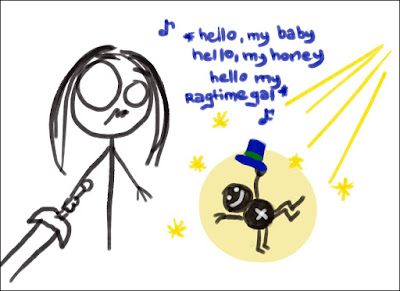Story for the Day: Tirlough's Bluff

Frewyn has many romantic legends, one of the most prominent being the history behind Tir Bryn, or Tirlough's Bluff. Tirlough was General to Brave King Breian, the king responsible for winning the First Galleisian War. Thanks to Tirlough's excellent tactics, the war was won in a week and thence Frewyn enjoyed a long period of peace. After the war, however, an injured Galleisian woman was found near Westren, Tirlough's home. His clan nursed her back to health, and just as Tirlough was about to return to his post in Diras, he realized that he had fallen in love with the Galleisian woman. His position took him away from Westren, but his clan promised to look after Frihet until Tirlough could return. He promised to come back every Gods' Day to see her. His promised was kept, and every week the two would meet at the large tree on the bluff between Kileen and Westren. They were married on the bluff and were eventually buried there when their time came. There is a series being








